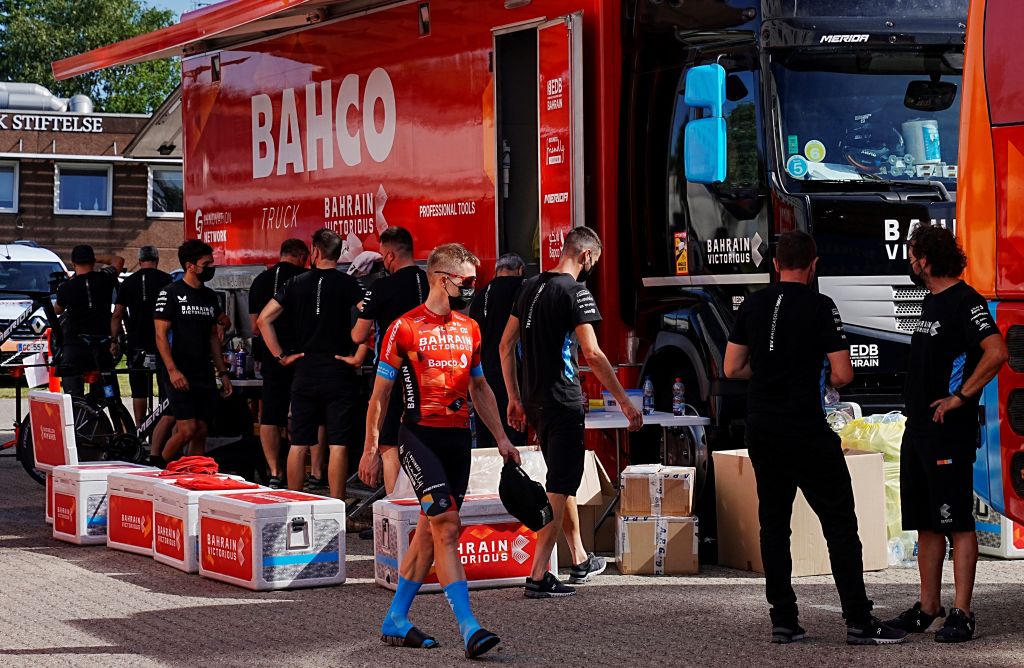Italian rider association claims Bahrain Victorious investigation is a 'barbaric witch hunt'
'Today cycling is beautiful and clean' says Salvato

The president of the Association of Italian Professional Cyclists (ACCPI) has described the Europol-coordinated investigation into Bahrain Victorious as a "witch hunt" and decried police searches of the riders’ homes and hotel rooms as "barbaric".
Bahrain Victorious have been under investigation by the public prosecutor’s office in Marseille since last year, when their hotel was raided during the Tour de France.
Ahead of this year’s race, law enforcement carried out simultaneous searches on team riders and staff in Belgium, Spain, Croatia, Italy, Poland and Slovenia. On the day before the Tour began, the Bahrain Victorious team hotel was searched by police in Denmark.
In a statement on Friday, Europol confirmed that the investigation into Bahrain Victorious centred on the “the use of prohibited substances in cycling races,” while Eurojust revealed that “412 capsules with undetermined brown content and 67 capsules with undetermined white content” were found during the search in Slovenia.
Cristian Salvato, the president of the ACCPI, has since issued a statement criticising the police investigation into Bahrain Victorious and claiming that “today cycling is beautiful and clean".
“We don’t approve of the methods, the timing or the spectacle of the incident, which we read about in all the newspapers and heard about from our lads,” Salvato said. “For an inquiry to bear fruit, it should be carried out discreetly throughout the year, not simply like clockwork in the days of the Tour.”
Damiano Caruso, the one Italian rider in the Bahrain Victorious squad at the Tour, confirmed to Cyclingnews that his home had been searched by police in Sicily shortly before his departure for the race. Europol confirmed that the NAS unit in Ragusa, as well as those in Rome and Brescia, was part of the coordinated inquiry.
Get The Leadout Newsletter
The latest race content, interviews, features, reviews and expert buying guides, direct to your inbox!
“We don’t dispute the desire to fight doping by every means,” Salvato said.
“Indeed, I would like to remind you that cyclists are the only athletes in the world who invest a percentage of their prize money in the fight against the doping and that with the whereabouts system, they accept limits on their own privacy and that of their families in order to ensure out of competition tests can be carried out.
"But we can’t accept that they come to be treated like this.”
Neither the UCI nor Tour organiser ASO issued any statement on the matter before the race began, though UCI president David Lappartient later told reporters in Copenhagen that he welcomed “this high-level collaboration”, adding: “Afterwards, it will be for the police and the judge to decide."
Salvato, however, decried what he called “the silence […] of all the institutions,” seemingly suggesting that the sport’s governing body should have come to the defence of the riders who are under investigation.
“The ugliness of the past is in the past, today cycling is beautiful and clean,” Salvato insisted. “If somebody was doing the fool, they would be certainly caught, and all the sanctions are available to remove them from the sport.”
The International Testing Agency has yet to sanction a single rider in the men’s WorldTour since it took over testing from the Cycling Anti-Doping Foundation at the beginning of 2021. In a press conference ahead of the Tour, Lappartient claimed the lack of positive tests from the ITA collaboration was “good news", though he conceded: “However, we’re not so naive to believe there’s no more doping.”
Lappartient also added that the anti-doping programme is currently under-funded. "It is priceless but the cost to us is around 8 million CHF, and it will probably have to be more in the future,” he said. “There are conversations with stakeholders to increase the contribution by 20-25%.”
Salvato, meanwhile, concluded his statement by touching upon an internet conspiracy theory suggesting that police were acting on a hoax tip-off – “I think we’ll hear this spoken about in the coming days” – and calling for an end to the police searches. “Let’s put an end to these barbaric methods and this witch hunt,” he said.

Barry Ryan was Head of Features at Cyclingnews. He has covered professional cycling since 2010, reporting from the Tour de France, Giro d’Italia and events from Argentina to Japan. His writing has appeared in The Independent, Procycling and Cycling Plus. He is the author of The Ascent: Sean Kelly, Stephen Roche and the Rise of Irish Cycling’s Golden Generation, published by Gill Books.